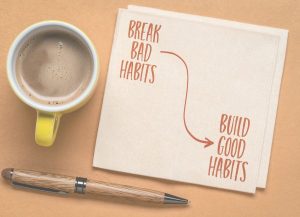In financial terms, your “bottom line” essentially means your profit. Whether it’s what’s left after you’ve allocated your income to expenses and spending in the month (via your budget). Or, if you’re calculating your net worth by deducting your total debts from your total assets. Either way, we want our “bottom line” number to be as high as possible. The more profit, the more we can grow our wealth.
Unfortunately, certain toxic money behaviors can reduce our bottom line number. It can happen in small, sneaky ways, or it can happen in big, drastic ways. Regardless, it’s important to be mindful of the bad spending behaviors that can have the opposite effect of what we want. Keep reading for 5 toxic money behaviors hurting your bottom line.
5 Toxic Money Behaviors Hurting Your Bottom Line
#1 Overspending on non-necessities
This toxic money behavior should come as no surprise. Spending more than you need to on non-necessities is one of the quickest ways to go broke, drain your savings, or wind up in debt. All of those things impact your bottom line negatively. Now, I don’t want you to think that you can’t spend any money on non-necessities, because you can. The goal is to make sure they’re factored into your budget.
In CGS Podcast Episode 70 – My Budget Non-Negotiables, I share some of the “non-necessities” I’ve added to my budget. I don’t feel guilty spending my money on those things because they bring me joy and they’re accounted for. Take some time to think about the things that bring you joy and allocate a reasonable amount of money to those things in your budget.
#2 Constantly pulling money out of savings
Another toxic money behavior we want to nip in the bud is pulling money out of savings on a regular basis. The entire purpose of a savings account is to keep the money in there, saved for a goal or specific purpose. If you constantly pull money out of your savings account, you’re defeating the purpose. Not to mention, you’re training your brain to think it’s okay to pull money out of savings.
Sometimes, people constantly pull money out of savings because they have too much going in there in the first place. Saving too much money can be a problem. Instead, review your budget to determine a reasonable amount of money to save monthly and save that amount. Make sure it’s an amount that won’t be missed or that won’t impact your other needs.
#3 Accruing interest on credit card balances
Anyone who has been in credit card debt understands this. Interest accruing on credit card or other debt balances is a big problem. Not only are the amounts typically outrageous, but they make it that much harder to actually pay the balances down. Often times, overspending is what leads to credit card debt. Other things like unexpected expenses with no savings can add to those balances. If you can fix the toxic money behaviors that drive up credit card balances, you should be able to avoid growing interest payments.
If you do find yourself in high-interest debt, stop using your cards immediately and get yourself on a plan that helps you pay your balances down – ideally using the Snowball method. It likely won’t happen overnight, but slow and steady can be an effective strategy for paying down your debt. Grab a copy of my Debt Repayment Checklist to help.
#4 Trying to keep up with the Joneses
Nine times out of ten, the Joneses are broke. But even if they aren’t, trying to keep up with people is a losing battle. Not only do you fail to understand what a person really has or how they can spend (do you have insight into their bank accounts?) but you’re basing your own happiness off of what someone else has or does.
Social media makes it very hard to be happy with what you have, but you need to try. The influencers you follow may be broke, in debt, or getting funding from sources you don’t know about. Comparing your life or trying to live a similar life to theirs will only lead to unhappiness. Learn to appreciate what you have and work to obtain the things YOU want out of life. That will help you break this toxic money behavior.
#5 Spending money before you get it
We’ve all been there – planning out how to spend an upcoming bonus, tax refund or windfall of money before we get it. Some of us may have gone as far as actually spending the money before it hits our account. Don’t do that. It’s a recipe for disaster. What if you don’t get as much as you planned? What if something else comes up that money needs to go towards?
Spending money before you get it can have some terrible repercussions. It may force you to add to your debt. It may force you to cancel plans or go back on your word. It may force you to make some decisions you don’t want to make.
There’s nothing wrong with having a plan for extra money – in fact, I recommend you do. However, don’t make it a habit of spending extra money before it actually comes to you.
Related: 10 Bad Spending Habits that Can Hurt You Down the Line
The toxic money behaviors I listed above are very common, so don’t think you’re the only one who struggles with them. Silver lining? Each of the behaviors are 100% in your control to fix. It starts with awareness, then being mindful, then finding alternatives to the behaviors and sticking with it. It won’t change completely overnight, but you can start to form money habits that increase your bottom line! Have you found yourself doing any of the toxic money behaviors listed above? What helped you break free? Share your comments in the Comments section below!
-Raya
The CGS Team







3 thoughts on “5 Toxic Money Behaviors Hurting Your Bottom Line”
I’d love to get away from using credit cards, but I find myself opening up new ones often to take advantage of offers. How do you feel about balance transfer offers to avoid high credit card interest rates?
I’m a fan of balance transfer offers, but only if your budget is tight. If you can pay the balance off before interest kicks in, it’s a great option. If you tend to overspend or don’t have a budget in place, it’s not worth it to pay interest after the promo period ends.
I suffer from all of these. My husband and I have different ideas for how to manage our money, and at some point I gave up trying and just let him have at it. I didn’t have money as a kid and now I have some and find myself burning holes in my pocket whenever we finally have some. I wan’t everything and don’t have someone always telling me “no its too expensive” (my parents did this for EVERYTHING!). I don’t even know where to start other than therapy.